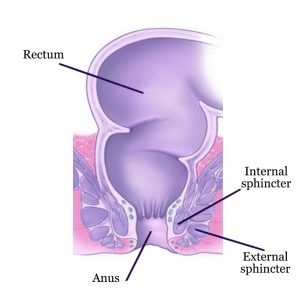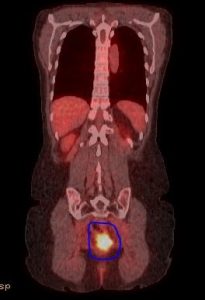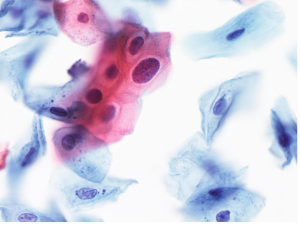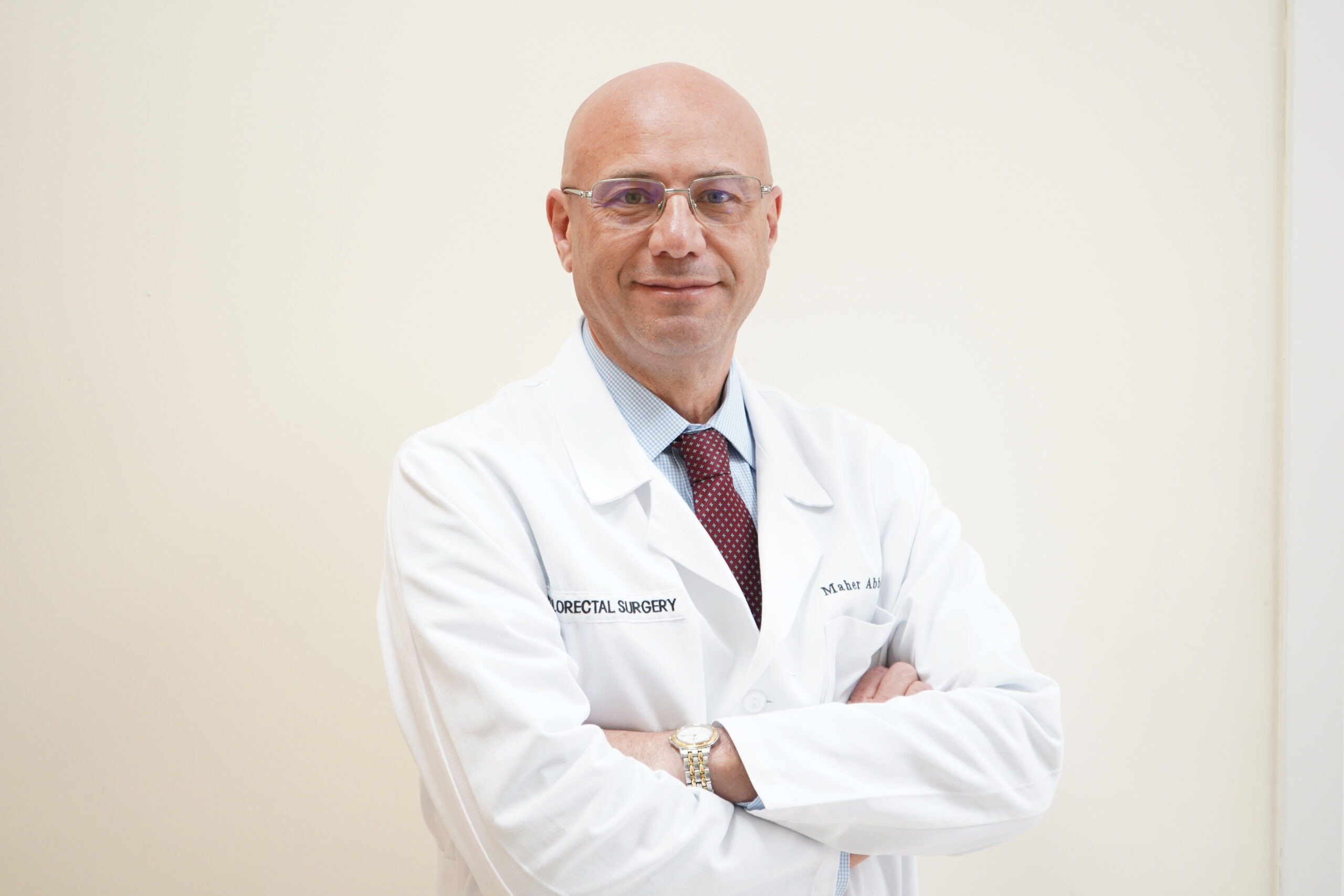What is anal cancer?
The anus is the last portion of the large bowel [Figure 1]. It is a short tube surrounded by the sphincter muscles (internal and external) which provide control of bowel motion. Anal cancer arises when the normal cells lining the anus or surrounding skin divide and grow without stopping. In the early phase, the cancer is superficial but as it progresses it grows deeper into the sphincter muscles. Anal cancer occurs in both genders but about two-thirds of patients are women. The number of anal cancer cases is on the rise in the USA and worldwide.

Figure 1 – The anus with surrounding internal and external sphincter muscles
What causes anal cancer?
The human papilloma virus (HPV) is the most common risk factor for anal cancer. There are many different types of HPV which are typically sexually transmitted. The majority of patients with HPV have no symptoms but some develop genital warts, precancerous skin lesions (Anal Dysplasia and Warts) and/or anal cancer. Other risk factors include the following: anal sex, sexually transmitted disease, numerous sexual partners, smoking, weakened immune system (such as in patients with organ transplantation, on chemotherapy, or with the diagnosis of human immunodeficiency virus). Women with prior history of HPV of the cervix are also at risk.
What are the symptoms of anal cancer?
Patients with anal cancer have one or more of the following symptoms: anal pain, itching, a growing lump, a non-healing rash or ulcer, drainage and discharge, rectal bleeding, change of bowel habits or narrowing of the stool, and/or swollen glands around the anus or the groin. It is important to note that patients with anal cancer are often misdiagnosed and treated for hemorrhoids with a delay in diagnosis.
How is anal cancer diagnosed?
The history and physical examination are important in making the diagnosis of anal cancer. Since anal cancer is uncommon, it is important to seek expert care. An office-based examination includes visual inspection of the skin, finger palpation of the anus, and Anoscopy or Proctoscopy to look inside the anus and rectum. In addition to checking the abdomen, both groins should be examined for any palpable lymph nodes. Any suspicious lesion is biopsied. This can be done as an office-based procedure but in some patients the biopsy and examination are performed in the operating room under an anesthetic. Colonoscopy is advisable to check the rest of the large bowel. When the diagnosis of cancer is confirmed on biopsy, imaging of the entire body is recommended with PET CT (Positron Emission Tomography) [Figure 2]. This important test determines the stage of the cancer.

Figure 2 – PET CT of the entire body demonstrating the anal cancer
(inside the blue circle)
How is anal cancer treated?
Depending on the exact location and stage of the anal cancer the treatment may vary from chemotherapy and radiation therapy to surgery. Early cancer involving the skin away from the anal opening can be treated by local excision. Cancer involving the anal canal is treated with chemotherapy and radiation therapy. Anal cancer requires highly specialized care and should only be treated by physicians with expertise in the treatment of this type of cancer in order to achieve the best outcome. When diagnosed early and treated properly, a cure is achievable in the majority of the patients. Surgery is reserved for patients who do not fully respond to the treatment or in case of long-term recurrence. Under such circumstance removal of the anus and rectum with the surrounding lymph glands is necessary with the need for a permanent colostomy (stoma opening) in the abdominal wall.
Patients with anal cancer should be followed closely for 5 years after the treatment. Surveillance is done every 3 to 6 months and include physical examination and imaging tests. After 5 years, an annual examination is recommended.
What preventive measures or screening is available?
Any patient with anal symptoms should get checked by a properly trained proctologist. Screening for anal cancer include visual inspection, finger palpation of the anus, and Anoscopy or Proctoscopy to look inside the anus and rectum. Specialized techniques such as high resolution anoscopy and biopsy are reserved for a subgroup of at-risk patients [Figure 3].

Figure 3 – Cancer cells on biopsy
Having protected sexual intercourse and limiting the number of sexual partners can decrease the risk of HPV transmission. Vaccination against HPV can be helpful but is not a guarantee as the currently available vaccines cover just a few of the HPV types. In order for the vaccination to have any effectiveness, it has to be administered before engaging in any sexual activity. Once infected with HPV, the vaccine may not yield any benefit. Smoking cessation is advisable in patients to decrease the risk of progression from HPV infection to anal cancer.
Why is it important to seek expert care with a board certified proctologist and colorectal surgeon?
Anal cancer is uncommon and only a minority of doctors have the expertise to screen and treat this condition. Often patients are incorrectly diagnosed with hemorrhoids and treated as such with significant delay in diagnosis. Early diagnosis of anal cancer is key to increase the chances of a cure.

Dr. Maher Abbas is an expert in the treatment of diseases of the colon, rectum and anus. With over a 30-year career in the USA, he has completed advanced surgical training and is American Board Certified in Colon and Rectal Surgery. Dr. Maher Abbas is a Fellow of the American Society of Colon and Rectal Surgeons.
If you would like to schedule a consultation with Dr. Maher Abbas to discuss your case, click here.





